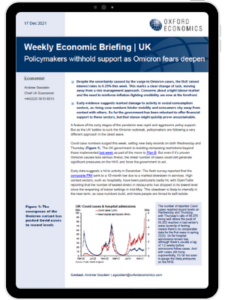Policymakers in the UK withhold support as Omicron fears deepen

Despite the uncertainty caused by the surge in Omicron cases, the BoE raised interest rates to 0.25% this week. This marks a clear change of tack, moving away from a risk management approach. Concerns about a tight labour market and the need to reinforce inflation-fighting credibility are now at the forefront. Early evidence suggests marked damage to activity in social consumption sectors, as rising case numbers hinder mobility and consumers shy away from contact with others. So far the government has been reluctant to offer financial support to these sectors, but that stance might quickly prove unsustainable.
What you will learn:
- The UK government is resisting reimposing restrictions beyond
those implemented last week as part of the move to Plan B. But even if it’s proven Omicron causes less serious illness, the sheer number of cases could still generate significant pressures on the NHS and force the government to act. - Early data suggests a hit to activity in December. The flash survey reported that the composite PMI sank to a 10-month low due to a marked slowdown in services.
- The MPC’s justification for hiking rates centred on the tightness of the labour market, with another strong release this week deemed enough to fulfil the criteria it had previously set for tightening policy.
Tags:
Related research

Post
Tariff Sector Vulnerability Index
Electronics, electricals, motor vehicles, pharmaceuticals and machinery are most exposed globally to US-imposed tariffs.
Find Out More
Post
Silver lining for China’s residential real estate sector
Residential real estate commencements (floor area) are expected to pick up over 2025. However, activity will remain at structurally lower levels, with Chinese authorities expected to maintain their goal to clamp down on speculative demand.
Find Out More